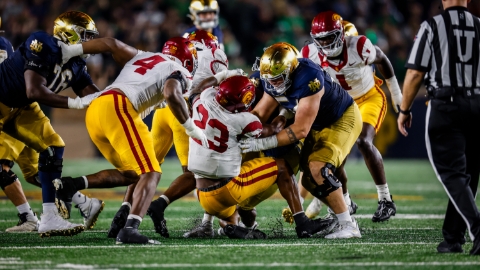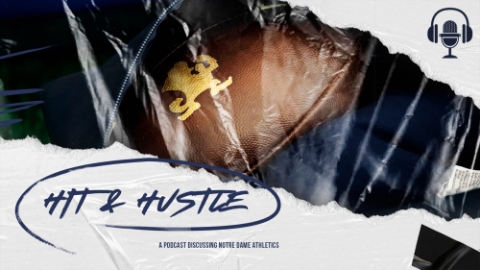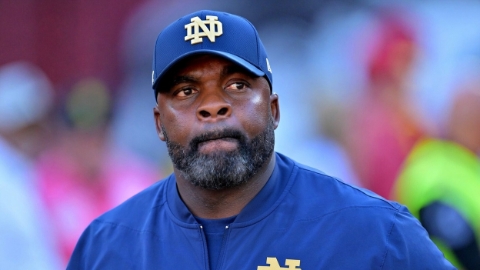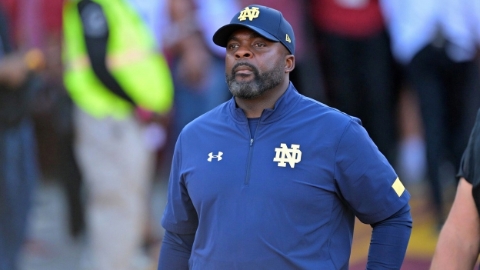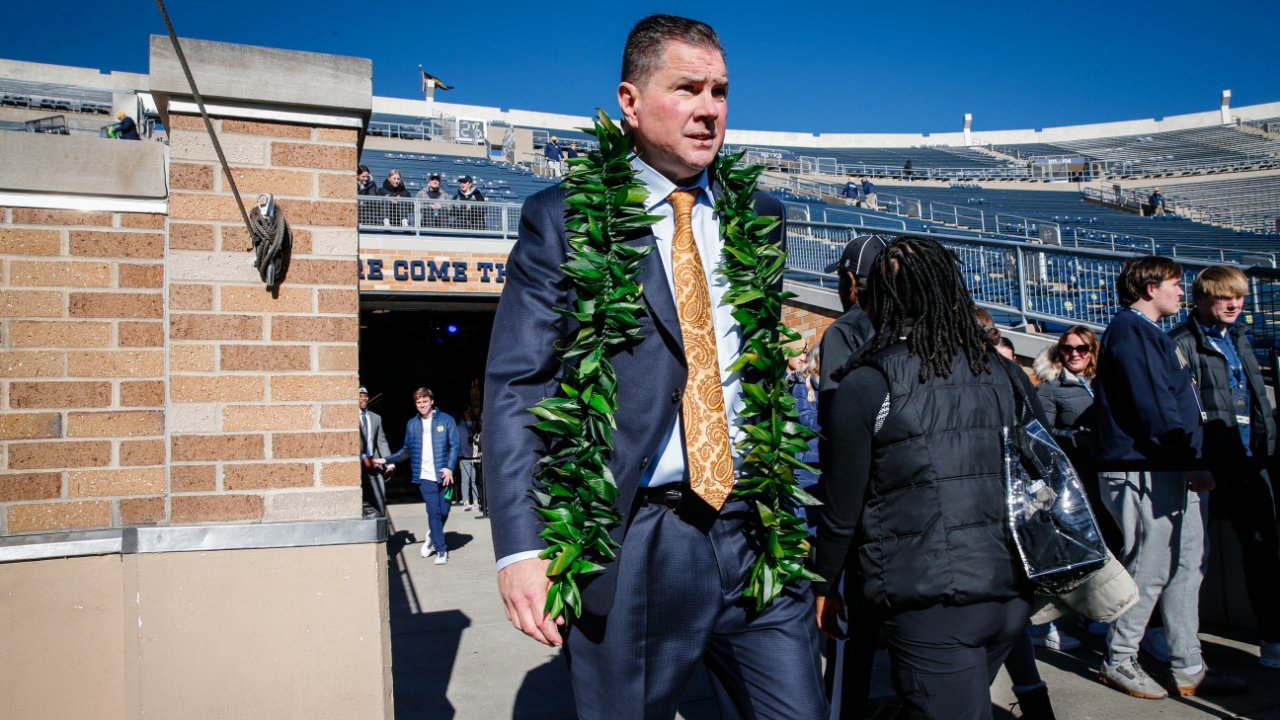
College football is always changing.
Teams will now have the option to use helmet communication for FBS games with one player on the field. The NFL has long used coach-to-player communication, so college football is officially catching up after the Connor Stalions fiasco.
Typically, the quarterback will be given the ‘green dot’ on offense, while the Mike linebacker will be responsible for defense. Notre Dame is still in the process of working through how they will use it, which includes multiple linebackers being tasked with the role during camp.
Notre Dame defensive coordinator Al Golden has been there and done that, so it shouldn’t be a major adjustment for him, but the operation still has to be efficient.
“We'll pick one green dot,” stated Golden. “We'll have two or three in reserve and then we'll manage it. If you're the green dot on first and second down, you're probably going to be the green dot on third down.
“We could have a situation where we say, ‘All right, take a blow. If we get into third down, you go.’ Again, I'm glad I have experience with it. Hopefully, I can share that with our staff so we can operate smoothly, but it is different. It is a challenge, and we'll see where it goes.”
The other significant change will be the use of tablets on the sideline. Coaches will use iPads and Microsoft tablets to show video or pictures to players, which has also been a staple in the NFL for years.
It’s a great tool, but Golden is very aware that coaches must be careful when presenting information on the sidelines. In fact, Golden’s defensive staff in the NFL did away with the video aspect and opted for pictures of formations.
“Don't grade the game,” Golden said. “If you get your butt kicked on a play, there's going to be real-time footage of you getting your butt kicked on a play. Like, refocus, reload, put it behind you and go. Same thing with the coaches.”
Golden’s emphasis on not grading players during the game is a significant point. There simply isn’t enough time to waste on good or bad plays and no coach wants to get further into his player’s head - positive or negative.
“We're not there to grade the game,” explained Golden. “We’ve got to be really concise in our coaching points. Watch what we have to watch, and then talk to the players about what's coming up next and where we're going on the next third down, where we're going on the next red-zone play.
“You can get enamored with it. We had it for three preseasons. I don't know what year — you guys could look it up. There's a lot of times you look over to the bench and everybody's looking down at the iPad. We’ve got to be careful with that.”
On the field, Golden’s NFL-style defense has given offenses fits over his first two seasons at Notre Dame. There might not be a better example of success than holding Ohio State’s prolific offense to 38 points in two games.
But what gives it the NFL-style term?
“We're not a 3-3 defense, which nobody in the NFL runs,” Golden explained. “We're not that. We're not from that family. We're not in a situation where we're just playing like three-match 80% of the time. We're doing a variety of different things. We play a number of coverages. We are not afraid to mix our personnel up on third down.
“Some teams are rigid, and the ends play end on third down, and the tackles play tackle, and linebackers play linebacker. But to make it difficult against protections, you want to have guys that are multiple, that can play different spots.”
Yes, it’s challenging to learn. It might take a young player more time to see the field, but Golden and head coach Marcus Freeman are fine with that as the results speak loud, including at the NFL level and that’s rewarding as a coach.
“The thing that you become very proud of as a coach is that when the guys come back from the combine or they come back from the Senior Bowl, and they say, ‘Yeah, we were all over it. We had the answers to the test because of those things,’” stated Golden. “Those fundamentals that are built into situational football— all of those things. It's a little bit more of an undertaking, but when you get it in the locker room, it's fun. It's fun to come to work every day.”
On the recruiting trail, Golden’s pitch is simple as it centers around making the most of the next 3-5 years.
“We try to sell ourselves,’ said Golden. “You would hope that that would be appealing to a lot of young men, that they’re going to leave here with the skill set and a variety of different things. Again, if you're going to put in 10,000 hours over the next three or four [years], put it into a system that's going to apply at the next level.
“Don't put it into a system where you're going to have to start from scratch three years from now. I think that's where hearing Marist (Liufau) and JD (Bertrand) and Javontae (Jean-Baptiste) and those guys come back from their experience and say, ‘Coach, thank you, thank you to the staff. Thank you.’ To do all those little things, it takes a little bit more, but at the end, it's preparing you for a career.”
- - - - - - - -
If you’re not a member of ISD, check out our Fall Camp Special!
Under Armour Heather Gray Notre Dame Fighting Irish Sideline Blitzing Trucker Adjustable Hat

